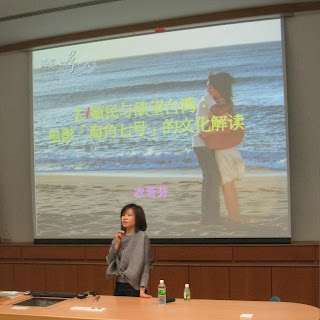

沈寂已久的台灣電影界,在2008年突然被「海角七號」吹響,振奮了好幾個月。「海角七號」以前後相隔六十多年,兩個都叫做「友子」的女子的愛情故事,穿插對照,拼湊出一部非常偶像劇式的電影。
因為日本老師離去而感情失落的小島友子,很容易讓人想起1943年日本為推廣皇民化及軍國主義思想而拍攝的電影「莎勇(Sayon)之鐘」。對看「莎勇之鐘」和「海角七號」,其中「殖民」與「去殖民」的視覺語彙與音樂元素,正好反映了戰後六十年台灣的變化歷程。
進入後現代文化情境,力圖「去殖民」和「去帝國」、「去中心」的台灣,同時也造成了不得不跟著「全球化」的傾斜。而「全球化」和「本土化」的衝突,在「海角七號」裡利用張揚慾望、發洩慾望,以及實踐慾望,讓觀眾達到集體的幻覺滿足。
「莎勇之鐘」裡的「台灣軍之歌」,唱的是遠征南洋;被改名為「昭南島」的新加坡,才是昭和天皇時的「國境之南」。在南洋看「海角七號」,或許別有會心。
Cultural Phenomenon in Taiwan Movie “Cape No. 7”
The movie “Cape No. 7” has unexpectedly attracted widespread popularity in Taiwan and become the highest grossing film produced. This is a trendy drama style movie, a comparison between the love stories of two ladies whom both happened to be called Tomoko within a gap of sixty years.
After the surrender of Japan, Kojima Tomoko was upset when her Japanese teacher was forced to return to his home country. This type of storyline is very similar to the movie “Sayon’s Bell”(1943), which was meant to promote Japanization and Militarism. The visual and music elements of “de-colonization” and “colonization” were used to correlate “Sayon’s Bell” and “Cape No. 7”. They were used to reflect Taiwan during the post war era after sixty years of evolution.
The “Songs of Taiwan Army of Japan” in the movie “Sayon’s Bell”, was referring to the expedition of South-Eastern Asia. In fact, during the period emperor of Shōwa, Singapore was named “Shōnantō”, which mean southern island obtained in the age of Shōwa. Perhaps, when we watch “Cape No.7” in Singapore, we will be inspired by the movie.











沒有留言:
張貼留言